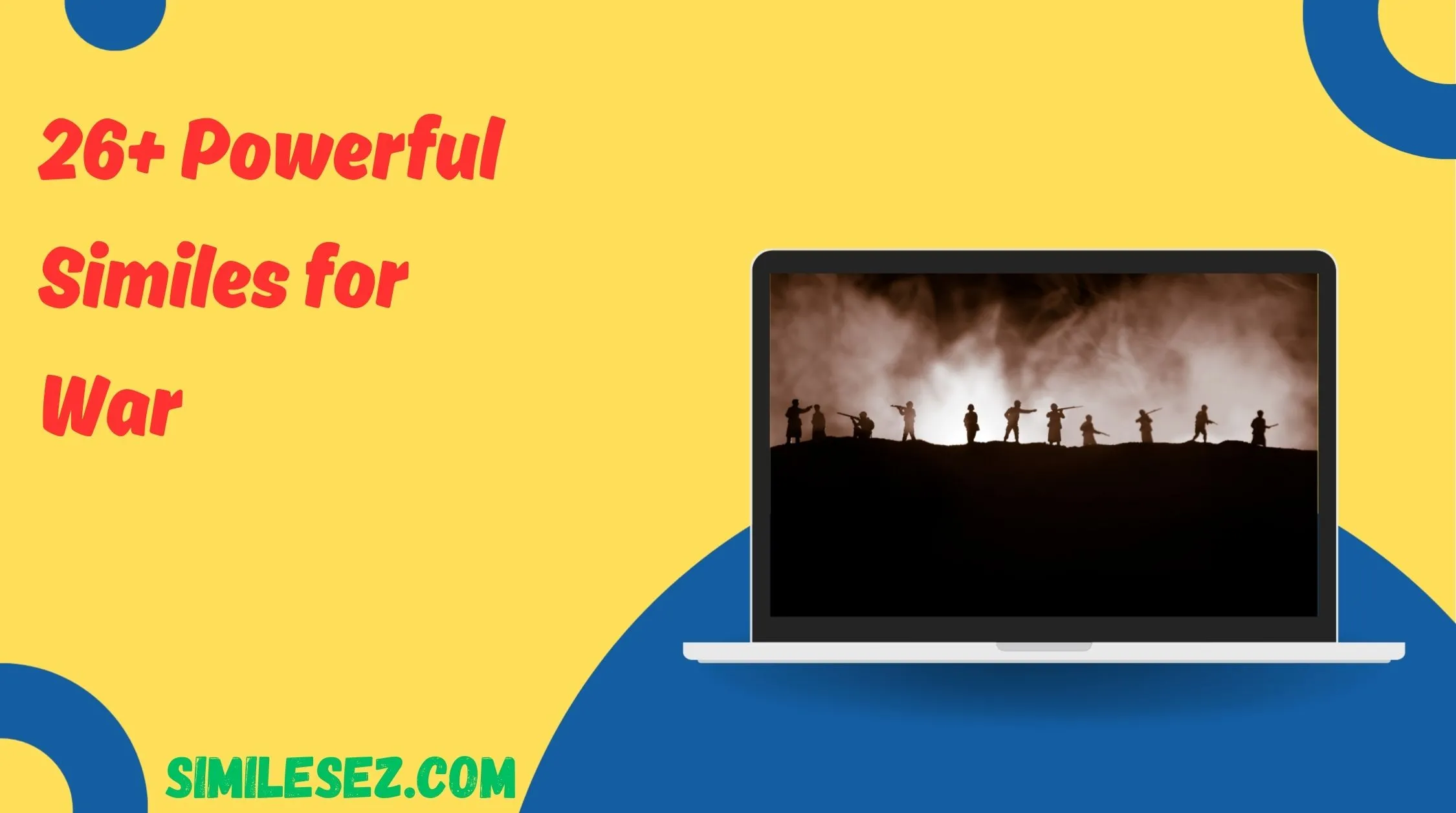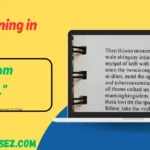Language has the power to paint vivid pictures, and one of the most powerful tools for doing so is the simile. A simile is a figure of speech that compares one thing to another using words such as “like” or “as.
” When it comes to the topic of war, similes have been used for centuries by poets, writers, and speakers to capture its intensity, chaos, and emotional impact.
Why is this interesting? Because war is more than just battles and weapons—it represents human struggle, survival, and change.
Similes make it easier to understand such complex ideas by linking them to everyday experiences.
If you’ve ever wondered how to describe the brutality, fear, or even the strange beauty of war in writing, this list will inspire you.
Let’s explore 26 striking similes for war that you can use in stories, essays, or creative projects.
What is a Simile?
A simile is a comparison that uses “like” or “as” to show similarities between two different things. Example: “War is like a storm, sudden and destructive.”
5 Quick Similes for War (at a glance)
| Simile | Meaning | Example Sentence |
|---|---|---|
| War is like a storm | Sudden, destructive, and uncontrollable | The attack was like a storm, leaving nothing untouched. |
| War is like wildfire | Spreads quickly and causes devastation | Fear spread like wildfire during the war. |
| War is like a game of chess | Strategic, requires planning and moves | The generals played war like a game of chess. |
| War is like a dark cloud | Brings gloom and hopelessness | War hung over the land like a dark cloud. |
| War is like broken glass | Painful and dangerous to handle | Families were torn apart like broken glass in war. |
26 Powerful Similes for War
1. War is like a storm
- Meaning: Sudden, fierce, and uncontrollable.
- Definition: Just as storms destroy everything in their path, war sweeps away peace and stability.
- Examples:
- The invasion came like a storm, overwhelming the city.
- His anger in battle was like a raging storm.
2. War is like wildfire
- Meaning: Spreads quickly, destroying everything.
- Definition: War consumes lives and lands the way wildfire devours forests.
- Examples:
- Hatred spread like wildfire during the war.
- Villages were consumed by war like dry grass in fire.
3. War is like broken glass
- Meaning: Painful, sharp, and leaves lasting scars.
- Definition: Just as shattered glass cuts deeply, war wounds societies.
- Examples:
- Families shattered like broken glass in war.
- Peace was fragile, breaking like glass at war’s touch.
4. War is like a dark cloud
- Meaning: Brings fear and despair.
- Definition: War looms over nations like heavy clouds before rain.
- Examples:
- War hung over them like a dark cloud.
- The silence before battle was like an approaching storm cloud.
5. War is like a game of chess
- Meaning: Strategic and calculated.
- Definition: Leaders make moves like chess players moving pieces.
- Examples:
- Generals moved soldiers like pawns in chess.
- The battle unfolded like a tense chess match.
6. War is like quicksand
- Meaning: Easy to enter, hard to escape.
- Definition: Once caught, war pulls people deeper into chaos.
- Examples:
- They sank into war like quicksand.
- Escaping war was as hard as pulling free from quicksand.
7. War is like poison
- Meaning: Corrupts slowly but fatally.
- Definition: War infects nations like poison in the blood.
- Examples:
- War spread through the land like poison.
- Hatred in war was as toxic as poison.
8. War is like thunder
- Meaning: Loud, frightening, and unavoidable.
- Definition: The sound of war echoes like thunder across lands.
- Examples:
- Gunfire rolled like thunder across the hills.
- His voice in battle was like thunder striking.
9. War is like a beast
- Meaning: Savage, uncontrollable, and hungry.
- Definition: War consumes like a wild beast feeding.
- Examples:
- War devoured them like a starving beast.
- Fear prowled the land like a beast of war.
10. War is like fire in the night
- Meaning: Both destructive and impossible to ignore.
- Definition: War glows dangerously like flames in darkness.
- Examples:
- The city burned like fire in the night.
- Hope flickered in war like a faint flame.
11. War is like an earthquake
- Meaning: Shakes foundations and leaves ruins.
- Definition: Just as quakes destroy structures, war destroys lives.
- Examples:
- The battle shook the city like an earthquake.
- Families collapsed like houses in an earthquake.
12. War is like winter
- Meaning: Cold, harsh, and unforgiving.
- Definition: War chills hearts like the coldest winter.
- Examples:
- War came like a harsh winter.
- Their spirits froze like rivers in winter.
13. War is like a shadow
- Meaning: Always present, haunting.
- Definition: War follows like an unshakable shadow.
- Examples:
- War followed them like a shadow.
- Fear clung like a shadow of war.
14. War is like a riddle
- Meaning: Confusing and hard to solve.
- Definition: War presents questions with no easy answers.
- Examples:
- Peace seemed like a riddle in war.
- The reasons for war were like tangled riddles.
15. War is like a burning sun
- Meaning: Overwhelming, inescapable.
- Definition: War scorches lives like a merciless sun.
- Examples:
- War blazed like a cruel sun overhead.
- The heat of battle burned like midday sun.
16. War is like a cage
- Meaning: Traps people and removes freedom.
- Definition: War imprisons dreams like bars in a cage.
- Examples:
- Civilians were trapped in war like birds in a cage.
- Freedom vanished like wings cut by a cage.
17. War is like a wound
- Meaning: Painful and slow to heal.
- Definition: War scars nations like deep wounds.
- Examples:
- The nation bled like an open wound.
- War left wounds deeper than swords.
18. War is like a tidal wave
- Meaning: Sudden and overpowering.
- Definition: War crashes into lives like violent waves.
- Examples:
- War swept them away like a tidal wave.
- Fear surged like a wave in war.
19. War is like a maze
- Meaning: Confusing, with no clear exit.
- Definition: War entangles lives like paths in a maze.
- Examples:
- Peace felt lost like a path in a maze.
- The politics of war were as twisted as a maze.
20. War is like hunger
- Meaning: Always growing, never satisfied.
- Definition: War consumes endlessly like hunger.
- Examples:
- War devoured resources like hunger.
- Their need for power grew like hunger in war.
21. War is like a nightmare
- Meaning: Terrifying and surreal.
- Definition: War feels unreal, like a nightmare come alive.
- Examples:
- The battlefield was like a living nightmare.
- War haunted his sleep like endless nightmares.
22. War is like a snake
- Meaning: Sneaky, deadly, and striking suddenly.
- Definition: War coils silently, then attacks like a snake.
- Examples:
- War struck like a hidden snake.
- Betrayal in war was as venomous as a serpent.
23. War is like a volcano
- Meaning: Builds pressure, then explodes violently.
- Definition: War erupts with destructive force like lava.
- Examples:
- Tensions exploded like a volcano into war.
- The city burned like lava from war’s volcano.
24. War is like a desert
- Meaning: Empty, harsh, and life-draining.
- Definition: War leaves barrenness like a desert.
- Examples:
- The land became like a desert after war.
- Hope dried up like water in desert sands of war.
25. War is like a mirror
- Meaning: Reflects humanity’s darkest side.
- Definition: War shows us truths we often avoid.
- Examples:
- War reflected greed like a cruel mirror.
- In war, people saw themselves like broken mirrors.
26. War is like a dance
- Meaning: Rhythmic, but deadly.
- Definition: Soldiers move in war like dancers in deadly rhythm.
- Examples:
- The soldiers moved like dancers in battle.
- War spun them around like a dark dance.
Writing with the Fire of Similes: Creative Tips
Want to make your writing stand out? Here’s how you can use similes about war:
- In poems: Compare war to natural disasters for strong emotional impact.
- In stories: Use war similes to describe battle scenes without relying only on action words.
- In essays: Employ similes to create vivid explanations of war’s effects on society.
- In songs: A well-placed simile can make lyrics unforgettable.
The secret is balance—too many similes can overwhelm, but the right one makes your writing unforgettable.
FAQs about Similes for War
What is a good simile for war?
A good simile for war is “War is like a storm” because it shows destruction, chaos, and unpredictability.
Why are similes used to describe war?
Similes make abstract or overwhelming ideas easier to understand by comparing war to familiar things like storms, fire, or shadows.
Can I use similes in academic essays about war?
Yes, but use them carefully. In formal essays, similes can add depth if they are explained clearly and not overused.
What is the difference between a metaphor and a simile for war?
A simile uses “like” or “as” (e.g., “War is like fire”), while a metaphor directly states war is something (e.g., “War is fire”).
How can I make my own simile about war?
Think of qualities of war—chaos, destruction, fear—and compare them to familiar things (storms, beasts, nightmares).
Conclusion
Similes breathe life into words, especially when describing something as vast and overwhelming as war.
From storms and shadows to beasts and mazes, each simile here gives you a new lens to capture the emotions and images tied to conflict.
Use them wisely in your stories, poems, or essays to make your writing unforgettable.










